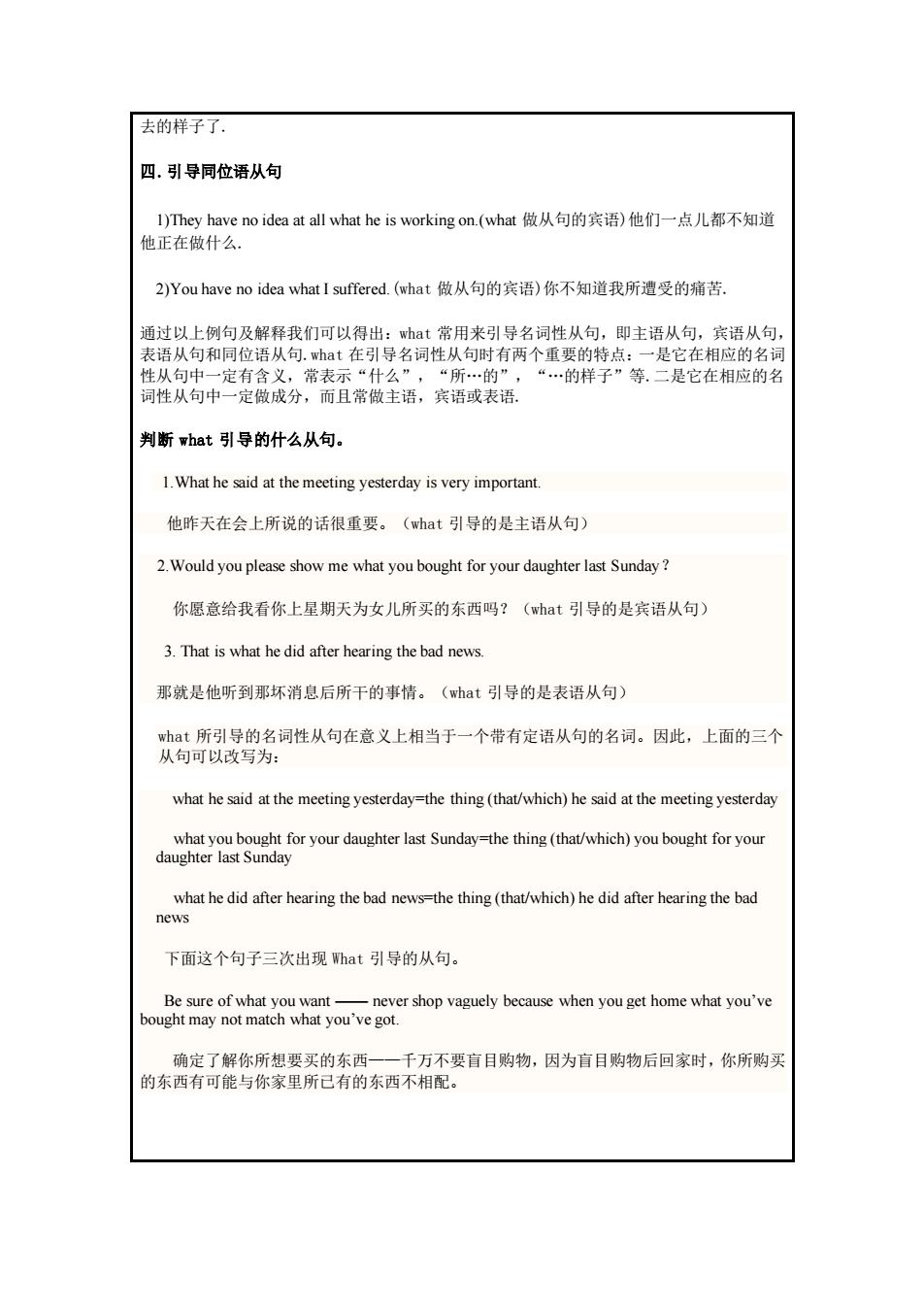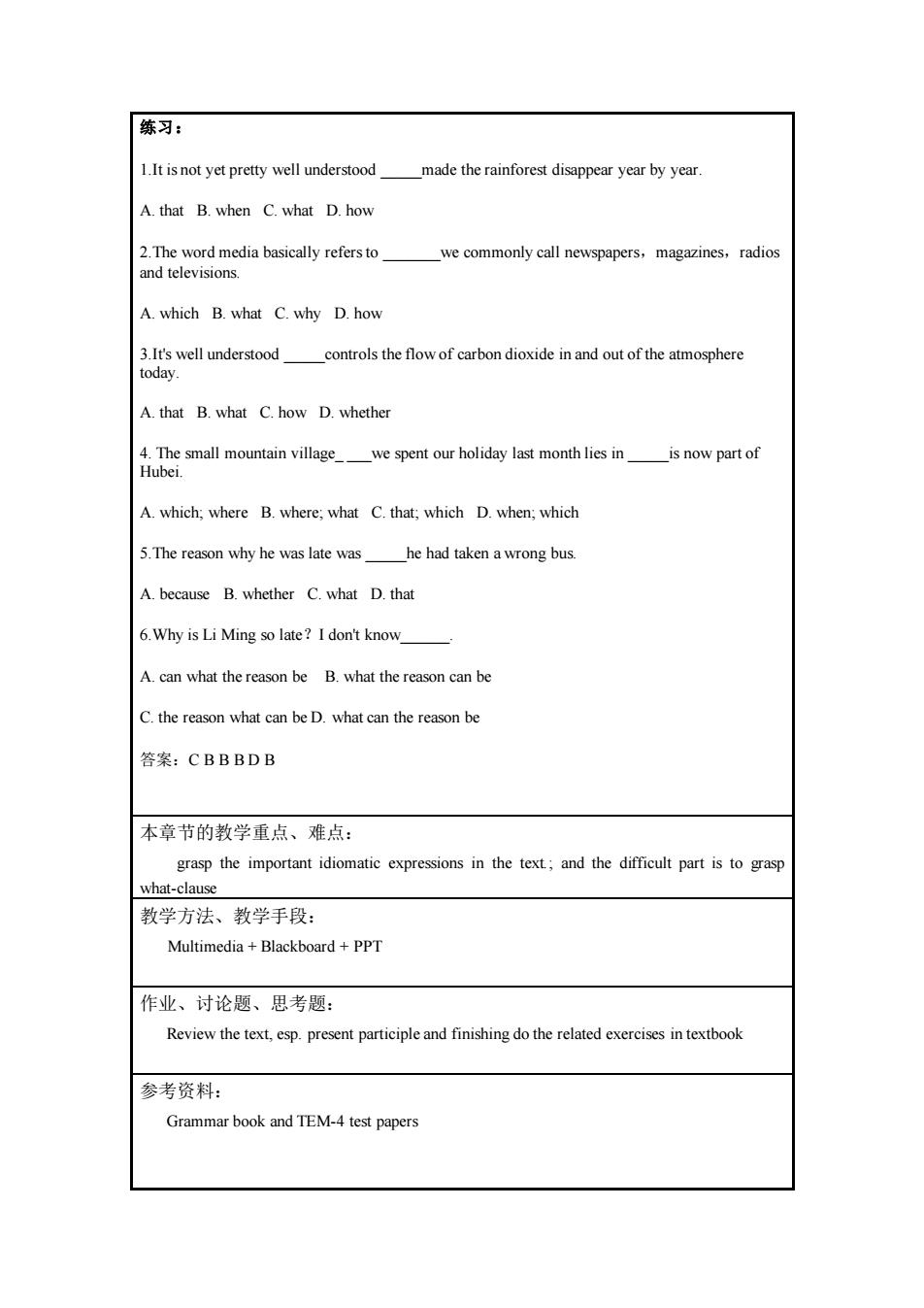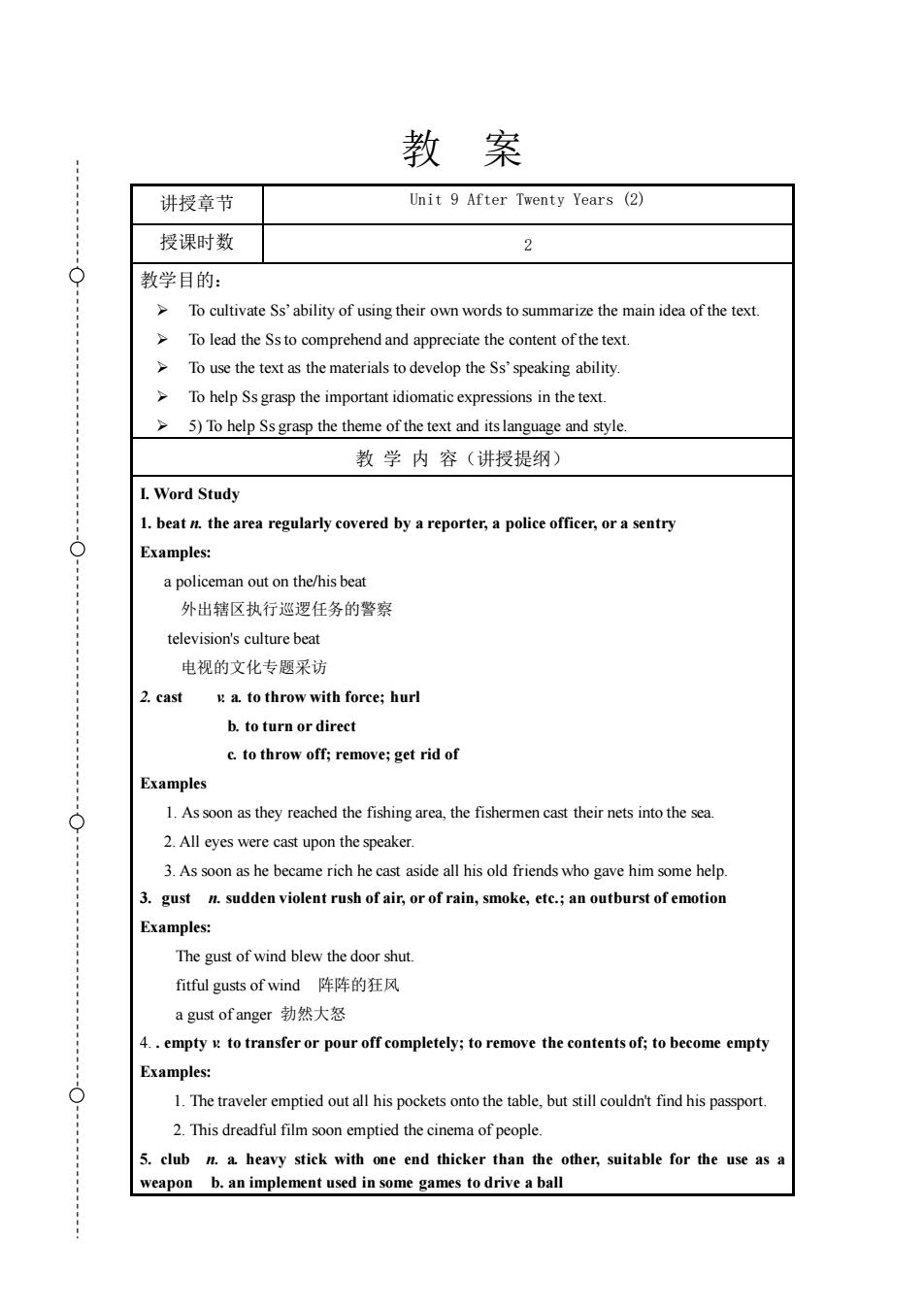
去的样子了 四.引导同位语从句 )They have no idea at all what he is workingon(.what做从句的宾语)他f们一点儿都不知道 他正在做什么. 2)You have no idea what I suffered.(what做从句的宾语)你不知道我所遭受的痛苦. 通过以上例句及解释我们可以得出:wht常用来引导名词性从句,即主语从句,宾语从句, 表语从句和同位语从句.ht在引导名词性从句时有两个重要的特点: 一是它在相应的名 “.的样子”等.二是它在相应的名 判断hat引导的什么从句。 1.What he said at the meeting yesterday is very important. 他昨天在会上所说的话很重要。(hat引导的是主语从句) 2.Would you please show me what you bought for your daughter last Sunday? 你愿意给我看你上星期天为女儿所买的东西吗?(hat引导的是宾语从句) 3.That is what he did after hearing the bad news. 那就是他听到那坏消息后所干的事情。(hat引导的是表语从句) ht所引导的名词性从句在意义上相当于一个带有定语从句的名词。因此,上面的三个 从句可以改写为: what he said at the meeting yesterday-the thing(that/which)he said at the meeting yesterday a ht for your daughter last Sundaythe thing(tha/which)you bought for your what he did after hearing the bad news-the thing(that/which)he did after hearing the bad news 下面这个句子三次出现hat引导的从句。 Be sure of what you want- never shop vaguely because when you get home what you've bought may not match what you've got. 确完了解你所相要买的东西 一一千万不要盲目购物,因为盲目购物后回家时,你所购习 的东西有可能与 家里所己有的东西不相配
去的样子了. 四.引导同位语从句 1)They have no idea at all what he is working on.(what 做从句的宾语)他们一点儿都不知道 他正在做什么. 2)You have no idea what I suffered.(what 做从句的宾语)你不知道我所遭受的痛苦. 通过以上例句及解释我们可以得出:what 常用来引导名词性从句,即主语从句,宾语从句, 表语从句和同位语从句.what 在引导名词性从句时有两个重要的特点:一是它在相应的名词 性从句中一定有含义,常表示“什么”,“所.的”,“.的样子”等.二是它在相应的名 词性从句中一定做成分,而且常做主语,宾语或表语. 判断 what 引导的什么从句。 1.What he said at the meeting yesterday is very important. 他昨天在会上所说的话很重要。(what 引导的是主语从句) 2.Would you please show me what you bought for your daughter last Sunday? 你愿意给我看你上星期天为女儿所买的东西吗?(what 引导的是宾语从句) 3. That is what he did after hearing the bad news. 那就是他听到那坏消息后所干的事情。(what 引导的是表语从句) what 所引导的名词性从句在意义上相当于一个带有定语从句的名词。因此,上面的三个 从句可以改写为: what he said at the meeting yesterday=the thing (that/which) he said at the meeting yesterday what you bought for your daughter last Sunday=the thing (that/which) you bought for your daughter last Sunday what he did after hearing the bad news=the thing (that/which) he did after hearing the bad news 下面这个句子三次出现 What 引导的从句。 Be sure of what you want —— never shop vaguely because when you get home what you’ve bought may not match what you’ve got. 确定了解你所想要买的东西——千万不要盲目购物,因为盲目购物后回家时,你所购买 的东西有可能与你家里所已有的东西不相配

练习: 1.It is not yet pretty well understoodmade the rainforest disappear year by year A.that B.when C.what D.how we commonly call newspapers,magazines,radios and televisions. A.which B.what C.why D.how 3.It's well understoodcontrols the flow of carbon dioxide in and out of the atmosphere oday. A.that B.what C.how D.whether small mountain vilgewe pent our holiday ast mnth lies inis ow part of A.which;where B.where:what C.that;which D.when;which 5.The reason why he was late washe had taken a wrong bus. A.because B.whether C.what D.that 6.Why is Li Ming so late?I don't know A.can what the reason be B.what the reason can be C.the reason what can be D.what can the reason be 答案:CBBBDB 本章节的教学重点、难点: grasp the important idiomatic expressions in the text;and the difficult part is to grasp what-clause 教学方法、教学手段: Multimedia+Blackboard+PPT 作业、讨论题、思考题: Review the text,esp.present participle and finishing do the related exercises in textbook 参考资料 Grammar book and TEM-4 test papers
练习: 1.It is not yet pretty well understood _made the rainforest disappear year by year. A. that B. when C. what D. how 2.The word media basically refers to _we commonly call newspapers,magazines,radios and televisions. A. which B. what C. why D. how 3.It's well understood _controls the flow of carbon dioxide in and out of the atmosphere today. A. that B. what C. how D. whether 4. The small mountain village_ _we spent our holiday last month lies in _is now part of Hubei. A. which; where B. where; what C. that; which D. when; which 5.The reason why he was late was _he had taken a wrong bus. A. because B. whether C. what D. that 6.Why is Li Ming so late?I don't know_. A. can what the reason be B. what the reason can be C. the reason what can be D. what can the reason be 答案:C B B B D B 本章节的教学重点、难点: grasp the important idiomatic expressions in the text.; and the difficult part is to grasp what-clause 教学方法、教学手段: Multimedia + Blackboard + PPT 作业、讨论题、思考题: Review the text, esp. present participle and finishing do the related exercises in textbook 参考资料: Grammar book and TEM-4 test papers

教案 讲授章节 Unit 9 After Twenty years (1) 授课时数 2 Q 教学目的: Prepare the Ss for the necessary cultural backgrounds Tocultivate Ss'ability of using their own words to talk about the related topic 教学内容(讲授提纲) 1.Doing the pre-class work Talk about your understanding and viewpoints of jobs. 2.Students'brief summary of the text(Retell the passage) 3.Warming-up exercises 1Think about and record the actions,words,and feelings that characterize friendship. 2)Ask student to sum up what kind of people cou e your forever friends.rifyou luck already havee ponderon which make you take hm/her as your forever friend 3)Compare your story with the text.Have you found anything unexpected? 4.About the author .He(162-1910)was the pen name of William Sydney Porter,an American shor surprise endings.O.Henry was born William Sydney Porter in Greensboro,North Carolina.He went to Texas in 1882 and worked at various jobs-as teller in an Austin bank(1891-1894)and as a newspaperman for the Houston Post.In 1898 an unexplained shortage in the Austin bank was charged to him.Although many people believed him innocent he fled to the Honduras but he first started writing short stories.Upon his release he settled in New York.Although his storie have been criticized as shallow and contrived,O.Henry did catch the color and movement of the city and evidenced a genuine sympathy for ordinary people.His approximately 300 stories are collected in Cabbages and Kings(1904).The Four Million(196).The Voice of the City(1908). Options(1).and others. Frontier Spirit and Expansion towards the West:This spirit has shaped American histor in a unique way.The frontier spirit that existed in the 19th century was born in part of a need to ow land.And the go raged the white toexploit the West.This mentality rermricans oyvivend en an In 1803 President Thomas Jefferson sent a secret message to Congress calling for an pedition into the area west of the Mississippi River to the Pacific Ocean.Fror then on the white mericans spared no effort to exploit the West.during this course.the West was developed but the
教 案 讲授章节 Unit 9 After Twenty years (1) 授课时数 2 教学目的: ➢ Prepare the Ss for the necessary cultural backgrounds. ➢ To cultivate Ss’ ability of using their own words to talk about the related topic. 教 学 内 容(讲授提纲) 1. Doing the pre-class work Talk about your understanding and viewpoints of jobs. 2. Students’ brief summary of the text (Retell the passage) 3. Warming-up exercises 1) Think about and record the actions, words, and feelings that characterize friendship. 2) Ask student to sum up what kind of people could be your forever friends. Or if you luckily already have one, ponder on the qualities which make you take him/her as your forever friend. 3) Compare your story with the text. Have you found anything unexpected? 4. About the author O. Henry (1862—1910) was the pen name of William Sydney Porter, an American short story writer. His short, simple stories are noted for their careful plotting, ironic coincidences, and surprise endings. O. Henry was born William Sydney Porter in Greensboro, North Carolina. He went to Texas in 1882 and worked at various jobs—as teller in an Austin bank (1891—1894) and as a newspaperman for the Houston Post. In 1898 an unexplained shortage in the Austin bank was charged to him. Although many people believed him innocent, he fled to the Honduras but returned to be with his wife, who was fatally ill. He eventually served three years in prison, where he first started writing short stories. Upon his release he settled in New York. Although his stories have been criticized as shallow and contrived, O. Henry did catch the color and movement of the city and evidenced a genuine sympathy for ordinary people. His approximately 300 stories are collected in Cabbages and Kings (1904), The Four Million (1906), The Voice of the City (1908), Options (1909), and others. Frontier Spirit and Expansion towards the West: This spirit has shaped American history in a unique way. The frontier spirit that existed in the 19th century was born in part of a need to own land. And the government then encouraged the white to exploit the West. This mentality and historical experience is favored by most Americans today as adventurous, active, and enterprising. In 1803 President Thomas Jefferson sent a secret message to Congress calling for an expedition into the area west of the Mississippi River to the Pacific Ocean. From then on the white Americans spared no effort to exploit the West; during this course, the West was developed but the

native Americans suffered extremely especially in the 19th century.The Americans were a competitive.ambitious,upwardly mobile people who had a strong sense of self-reliance.The conquering of an environment by an individual was a mark of success.Fear of unknown places was unacceptable and a hindrance to movement These traits,first formulated in western expansion,persist today with the slightest modifications Violence in the 19th Century:In the 19th century,the settlers in the west were most very tough and imprudent The way they settled conflicts with each other was very violent as then there were no adequate system of law and governmental institutions to turn to.And gunfighters were common Tobe able to handle gunss ned tobe a basic survival skill under the circumstances 4.Analysis of the structure of the text Part 1(paras-17)about:The policeman (Jimmy)met with Bob and had a conversation Part 2(paras.18-33)about:Bob was amrested by a plain clothes man without his awarenes he found that the policem was Jmmy. 5.Checking the students to read the new words and pronunciation correction 本章节的教学重点、难点: Prepare Ss for future understanding of the background knowledge 教学方法、教学手段: Multimedia+Blackboard+PPT 作业、讨论题、思考题: Read the following poemsand try to find ou the secrets ofjobs and friendship. Without ambition oe starts nothing Without work one finishes nothing The prize wi not be sent to you.You have to win it.The man who knows how will always have a job.The man who also knows why will always be his boss.As to methods there may be a million and then some,but principles are few.The man who grasps principles can successfully select his own methods.The man who tries methods,ignoring principles,is sure to have trouble. Emerson "But friendship is precious,not only in the shade,but in the sunshine of life;and thank to a benevolent arrangement of things,the greater part of life is sunshine." -Thomas Jefferson "The only thing to do is to hugone's friends tight and. -Edith Whartor 参考资料: The Internet
native Americans suffered extremely especially in the 19th century. The Americans were a competitive, ambitious, upwardly mobile people who had a strong sense of self-reliance. The conquering of an environment by an individual was a mark of success. Fear of unknown places was unacceptable and a hindrance to movement. These traits, first formulated in western expansion, persist today with the slightest modifications. Violence in the 19th Century: In the 19th century, the settlers in the west were most very tough and imprudent. The way they settled conflicts with each other was very violent as then there were no adequate system of law and governmental institutions to turn to. And gunfighters were common. To be able to handle guns seemed to be a basic survival skill under the circumstances. 4. Analysis of the structure of the text Part 1 (paras. 1—17) about: The policeman (Jimmy) met with Bob and had a conversation. Part 2 (paras.18—33) about: Bob was arrested by a plain clothes man without his awareness until he found that the policeman was his expected friend Jimmy. 5. Checking the students to read the new words and pronunciation correction 本章节的教学重点、难点: Prepare Ss for future understanding of the background knowledge 教学方法、教学手段: Multimedia + Blackboard + PPT 作业、讨论题、思考题: Read the following poems and try to find out the secrets of jobs and friendship. Without ambition one starts nothing. Without work one finishes nothing. The prize will not be sent to you. You have to win it. The man who knows how will always have a job. The man who also knows why will always be his boss. As to methods there may be a million and then some, but principles are few. The man who grasps principles can successfully select his own methods. The man who tries methods, ignoring principles, is sure to have trouble. —Emerson “But friendship is precious, not only in the shade, but in the sunshine of life; and thanks to a benevolent arrangement of things, the greater part of life is sunshine.” —Thomas Jefferson “The only thing to do is to hug one's friends tight and do one's job.” —Edith Wharton 参考资料: The Internet

教案 讲授章节 Unit 9 After Twenty Years (2) 授课时数 2 教学目的: >To cultivate Ss'ability of using their own words to summarize the main idea of the text To lead the Ssto comprehend and appreciate the content of the text. To use the text as the materials to develop the Ss'speaking ability. To help Ssgrasp the important idiomatic expressions in the text. 5)To help Ss grasp the theme of the text and its language and style 教学内容(讲授提纲) LWord Study 1.beat n.the area regularly covered by a reporter,a police officerora sentry Examples: a policeman out on the/his beat 外出辖区执行巡逻任务的警察 television'sculture beat 电视的文化专题采访 2.cast ga.to throw with force;hurl c.to throw off:remove:get rid of Examples 1.As soon as they reached the fishing area,the fishermen cast their nets into the sea. 2.All eyes were cast upon the speaker. 3.Assoon as he became rich he cast aside all his old friends who gave him some help. 3.gust n.sudden violent rush of air,or of rain,smoke,etc.;an outburst of emotion Examples: The gust of wind blew the door shut. fitful gusts of wind阵阵的狂风 a gust of anger勃然大怒 4.empty to transfer or pour off completely;to remove the contents of;to become empty Examples: 1.The traveler emptied out all his pockets onto the table,but still couldn't find his passport 2.This dreadful film soon emptied the cinema of people 5.club n.a heavy stick with one end thicker than the other, .suitable for the use as weapon b.an implement used in some games todrive a ball
教 案 讲授章节 Unit 9 After Twenty Years (2) 授课时数 2 教学目的: ➢ To cultivate Ss’ ability of using their own words to summarize the main idea of the text. ➢ To lead the Ss to comprehend and appreciate the content of the text. ➢ To use the text as the materials to develop the Ss’ speaking ability. ➢ To help Ss grasp the important idiomatic expressions in the text. ➢ 5) To help Ss grasp the theme of the text and its language and style. 教 学 内 容(讲授提纲) I. Word Study 1. beat n. the area regularly covered by a reporter, a police officer, or a sentry Examples: a policeman out on the/his beat 外出辖区执行巡逻任务的警察 television's culture beat 电视的文化专题采访 2. cast v. a. to throw with force; hurl b. to turn or direct c. to throw off; remove; get rid of Examples 1. As soon as they reached the fishing area, the fishermen cast their nets into the sea. 2. All eyes were cast upon the speaker. 3. As soon as he became rich he cast aside all his old friends who gave him some help. 3. gust n. sudden violent rush of air, or of rain, smoke, etc.; an outburst of emotion Examples: The gust of wind blew the door shut. fitful gusts of wind 阵阵的狂风 a gust of anger 勃然大怒 4. . empty v. to transfer or pour off completely; to remove the contents of; to become empty Examples: 1. The traveler emptied out all his pockets onto the table, but still couldn't find his passport. 2. This dreadful film soon emptied the cinema of people. 5. club n. a. heavy stick with one end thicker than the other, suitable for the use as a weapon b. an implement used in some games to drive a ball